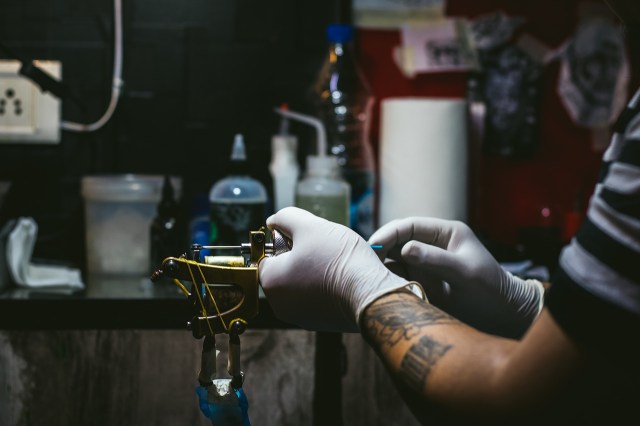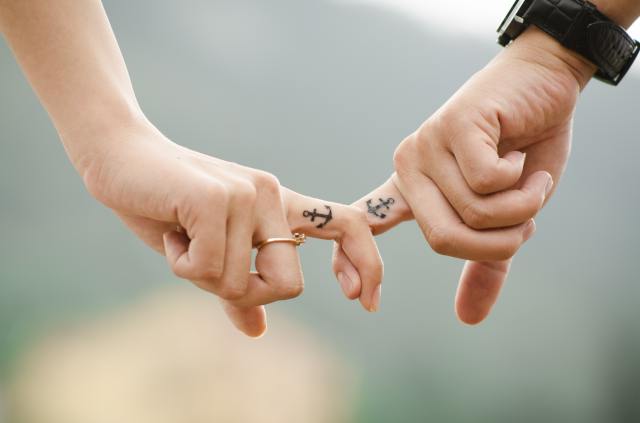
After three years of deliberation, the highest court in Japan has decided.
Tattoos aren’t illegal in Japan, but the social stigma against them is severely strong. Associated with yakuza and crime, tattoos can get individuals — guests from overseas or not — barred from certain establishments such as hot springs, gyms, swimming pools, and even beaches.
Tattoo artists also face the burden of this stigma, and in the case of one tattoo artist from Osaka, Taiki Masuda, tattooing without a medical license led to a 150,000 yen fine (US$1,433).
His case was moved to Japan’s Supreme Court in 2017, and after nearly three years the country’s highest court has made its decision: tattoo artists are no longer required to obtain medical licenses to practice their art.
▼ Though hot springs are a site of contention for tattoos, some hot spring venues such as this one with a view of Mt. Fuji have compromised for patrons with tattoos.
The Supreme Court’s logic for their ruling was that tattooing isn’t a medical practice, and is not something exclusively practiced by doctors, thus the law forbidding tattoo artists without a medical license from their craft lost its legal grounding.
For Taiki, who is also part of Save Tattooing, an advocacy group created to support the country’s 3,000 tattoo artisans, the ruling is certainly a win. But what exactly makes this ruling so important for tattoo artists in Japan?
In many countries, such as South Korea and now previously Japan, tattoo artists were legally barred from their craft if they didn’t obtain a medical license. Basically, you had to become a doctor to be a tattoo artist. Otherwise, if you were a tattoo artist in Japan caught without a medical license, you could be fined up to 1 million yen ($9,563) and/or receive up to three years of jail time.
▼ Hefty prices to pay for those small tattoos!
The main logic behind this law was that since tattoo artists have to use a needle to tattoo their customers, they need to go to medical school first to learn how to handle a needle properly.
Considering how tattoo artists who simply want to make body art without ties to the yakuza already have a hard time getting a steady flow of clients due to social stigma, the law necessitating a medical license acts more as a deterrent than an actual measure for safety and hygiene practices, given the burgeoning costs of medical school as well as the time and labor needed to graduate.
▼ I’m sure there’s some mastery required for using a tattooing needle, but really? A whole medical degree?
With this new ruling, it’s a little hard to predict how the legal regulations regarding tattoos will change. Perhaps new regulations will introduce a way for tattoo artists to get trained and be certified in a manner that doesn’t involve wasting a ton of time and money at a medical school. And while we don’t expect tattoo artists to suddenly not face anymore stigma overnight, this change could help loosen social attitudes toward tattoos in general as well.
After all, body markings in Japanese history weren’t always subjected to negative connotations, like the ones used by indigenous peoples such as the Ainu, and especially not these Jomon period (10,500 to 300 BC) tattoos.
Source: Livedoor News
Top image: Pixabay
Insert image: Pakutaso (1,2), Pexel
● Want to hear about SoraNews24’s latest articles as soon as they’re published? Follow us on Facebook and Twitter!



 Japanese requirement for tattoo artists to have medical licenses may be nail in industry’s coffin
Japanese requirement for tattoo artists to have medical licenses may be nail in industry’s coffin Tattooed Japanese woman suing nursing school after being suspended because of her ink
Tattooed Japanese woman suing nursing school after being suspended because of her ink Japan Supreme Court rules it’s constitutional to require married men and women have same surname
Japan Supreme Court rules it’s constitutional to require married men and women have same surname Japan’s cherry blossom season predicted to start earlier than we’d thought, especially in Tokyo
Japan’s cherry blossom season predicted to start earlier than we’d thought, especially in Tokyo One Piece creator has hidden secret of anime treasure’s identity in chest at bottom of real-world ocean
One Piece creator has hidden secret of anime treasure’s identity in chest at bottom of real-world ocean Is Tokyo Station’s startlingly expensive wagyu bento boxed lunch worth its high price?[Taste test]
Is Tokyo Station’s startlingly expensive wagyu bento boxed lunch worth its high price?[Taste test] Japan’s most popular domestic burger chain adds 100-percent vegan burgers to menu
Japan’s most popular domestic burger chain adds 100-percent vegan burgers to menu Starbucks Japan unveils new sakura cherry blossom collection for hanami season 2026
Starbucks Japan unveils new sakura cherry blossom collection for hanami season 2026 Sakura Festival in Chiyoda mixes illuminations, boats, music, and Rilakkuma in the heart of Tokyo
Sakura Festival in Chiyoda mixes illuminations, boats, music, and Rilakkuma in the heart of Tokyo These Pakistani students in Tokyo had never been to the beach, and that’s something we had to fix
These Pakistani students in Tokyo had never been to the beach, and that’s something we had to fix Which convenience store onigiri rice balls are the most popular? Survey reveals surprising results
Which convenience store onigiri rice balls are the most popular? Survey reveals surprising results Pizza Hut releases a ramen pizza in Japan, and it took half a year to perfect
Pizza Hut releases a ramen pizza in Japan, and it took half a year to perfect Taste-testing Japan’s real-world Dragon Balls and Senzu Beans at Marugame Seimen
Taste-testing Japan’s real-world Dragon Balls and Senzu Beans at Marugame Seimen Starbucks Japan releases first-ever Hinamatsuri Girls’ Day Frappuccino
Starbucks Japan releases first-ever Hinamatsuri Girls’ Day Frappuccino Japanese restaurant chain serves Dragon Ball donuts and Senzu Beans this spring
Japanese restaurant chain serves Dragon Ball donuts and Senzu Beans this spring Japan Extreme Budget Travel! A trip from Tokyo to Izumo for just 30,000 yen [Part 2]
Japan Extreme Budget Travel! A trip from Tokyo to Izumo for just 30,000 yen [Part 2] Japan’s craziest burger chain takes menchi katsu to new extreme levels
Japan’s craziest burger chain takes menchi katsu to new extreme levels Viral Japanese cheesecake from Osaka has a lesser known rival called Aunt Wanda
Viral Japanese cheesecake from Osaka has a lesser known rival called Aunt Wanda Japan’s newest Shinkansen has no seats…or passengers [Video]
Japan’s newest Shinkansen has no seats…or passengers [Video] Starbucks Japan releases new sakura goods and drinkware for cherry blossom season 2026
Starbucks Japan releases new sakura goods and drinkware for cherry blossom season 2026 Foreigners accounting for over 80 percent of off-course skiers needing rescue in Japan’s Hokkaido
Foreigners accounting for over 80 percent of off-course skiers needing rescue in Japan’s Hokkaido Super-salty pizza sends six kids to the hospital in Japan, linguistics blamed
Super-salty pizza sends six kids to the hospital in Japan, linguistics blamed Starbucks Japan unveils new sakura Frappuccino for cherry blossom season 2026
Starbucks Japan unveils new sakura Frappuccino for cherry blossom season 2026 Foreign tourists in Japan will get free Shinkansen tickets to promote regional tourism
Foreign tourists in Japan will get free Shinkansen tickets to promote regional tourism The 10 most annoying things foreign tourists do on Japanese trains, according to locals
The 10 most annoying things foreign tourists do on Japanese trains, according to locals Take a trip to Japan’s Dododo Land, the most irritating place on Earth
Take a trip to Japan’s Dododo Land, the most irritating place on Earth Naruto and Converse team up for new line of shinobi sneakers[Photos]
Naruto and Converse team up for new line of shinobi sneakers[Photos] Survey asks foreign tourists what bothered them in Japan, more than half gave same answer
Survey asks foreign tourists what bothered them in Japan, more than half gave same answer Japan’s human washing machines will go on sale to general public, demos to be held in Tokyo
Japan’s human washing machines will go on sale to general public, demos to be held in Tokyo Starbucks Japan releases new drinkware and goods for Valentine’s Day
Starbucks Japan releases new drinkware and goods for Valentine’s Day We deeply regret going into this tunnel on our walk in the mountains of Japan
We deeply regret going into this tunnel on our walk in the mountains of Japan Studio Ghibli releases Kodama forest spirits from Princess Mononoke to light up your home
Studio Ghibli releases Kodama forest spirits from Princess Mononoke to light up your home Major Japanese hotel chain says reservations via overseas booking sites may not be valid
Major Japanese hotel chain says reservations via overseas booking sites may not be valid Put sesame oil in your coffee? Japanese maker says it’s the best way to start your day【Taste test】
Put sesame oil in your coffee? Japanese maker says it’s the best way to start your day【Taste test】 No more using real katana for tourism activities, Japan’s National Police Agency says
No more using real katana for tourism activities, Japan’s National Police Agency says